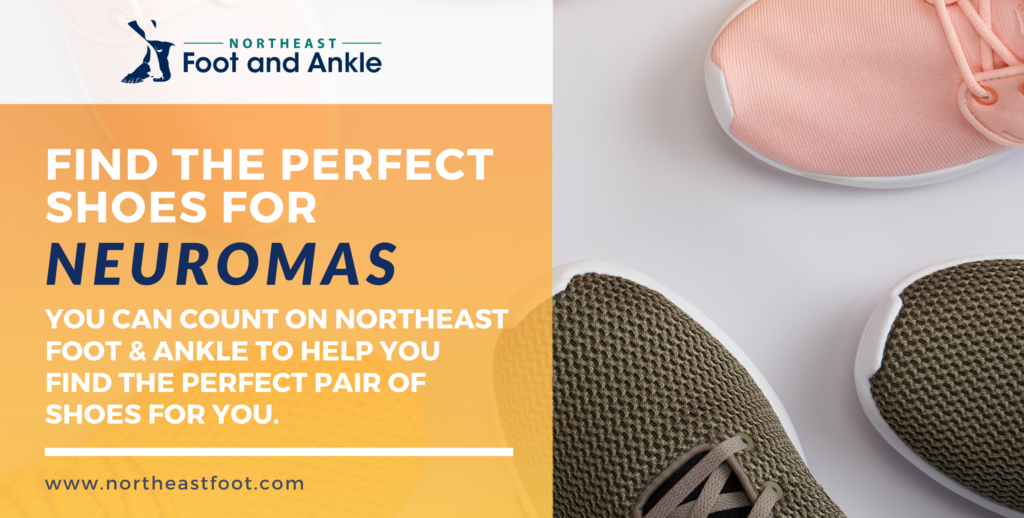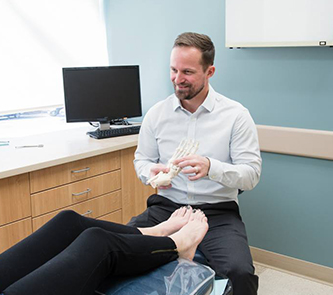Find the Perfect Shoes for Neuromas
What if we told you that pain is good?
Now, hold on a second – before you go looking for another source of information for your neuroma pain, allow us to elaborate:
When we say pain is good, we certainly don’t mean it in a way that feeling discomfort is a pleasurable experience – far from it! We know pain can keep you from doing the things you love and enjoy life to the fullest. In fact, we see this happen far too often to many people suffering from foot and ankle pain.
What we are saying though, is that it’s better to be able to feel pain rather than not. You see, pain is your body’s way of telling you something is wrong. And if you are unable to feel pain, your body becomes more exposed to even greater danger.
Lack of sensation – and the inability to feel pain – is often caused by nerve damage, and a good example of this are neuromas. (Though there are certainly other symptoms associated with this condition, and if you are still able to feel them, no worries – we have just what you need to find the relief you deserve!)

What are Neuromas?
Neuromas are the result of irritation and swelling in the digital nerves of the foot. As we’ve mentioned, this condition typically happens when nerves become damaged or trapped. The damaged nerve tissue can grow and form a small mass that causes pain, tingling, numbness, and burning sensations in the foot.
The most common location for a neuroma is in the ball of the foot near the base of the toes—a spot where the nerve can easily get pinched as it passes through the heads of the metatarsal bones before it branches into the toes. Many people describe feeling as though they are walking on a pebble or a balled-up sock.
Of course, you should never ignore nerve damage of any kind; however, when left untreated, neuromas in particular can turn into serious problems over time. Fortunately, we provide many effective neuromas treatment options to help you get rid of this condition for good. Even better – if your neuroma is not severe, conservative treatments like wearing appropriate shoes may be all you need to put a pep back in your step.
But better than providing neuromas treatment is helping you prevent this condition. And what better way to start a preventative plan than knowing what causes neuromas in the first place.
What Causes Neuromas?
The quick answer to that is:
Basically, anything that causes compression or irritation of the nerve can lead to a neuroma. That’s why two of the most common risk factors for this condition are wearing shoes with narrow toe boxes and high heels (since this type of footwear also tends to force the toes into the toe box).
However, there are other risk factors to keep in mind, including:
- The way your shoes fit.Footwear that is too small can also cause crowd your toes in the toe box, cramming them together and irritating the nerves between your toes.
- The way your feet move. Flawed biomechanics caused by conditions such as high arches and bunions can increase your risk of developing a neuroma.
- The activities you participate in. Regularly participating in sports that place excessive stress on the forefoot, as well as spending a lot of time on ladders and working in crouched positions are all activities that can increase your risks of developing neuromas.
- The injuries you have sustained in the past. Foot and ankle injuries can cause nerves to become damaged and increases your odds of developing neuromas.
That said, in order to prevent neuromas from developing – and even help manage neuroma symptoms – it’s important that we address each of these risk factors. And something as simple as wearing the right shoes is a great way to do just that!
Finding the Perfect Shoes for Neuromas

Choosing the perfect shoes for neuromas is, indeed, one of the best – and most simple – ways to treat and prevent this condition. With the right footwear, your biomechanics can be realigned to its proper position, your feet will be well protected during sports and other activities, and you can avoid painful injuries that may lead to a neuroma.
So when purchasing shoes, make sure to consider these aspects:
- Do they provide plenty of room for your toes to move freely? Always go for footwear that offers plenty of room for your toes in the toe box. Your toes should never be crowded or jammed into the front of the shoe.
- Do they provide plenty of arch support? Look for shoes that support your arches comfortably.
- Are the soles flimsy and easily bendable? If so, skip that option and go for shoes that feature thick, shock absorbent soles.
- Are the heels higher than 2 inches? Avoid them at all costs! Keep your heels below that mark as much as possible.
- Should you complement your shoes with custom orthotics? If you don’t already have custom orthotics, you should definitely consider getting a pair. Custom orthotics can provide the exact support and protection your feet need and are a great way to treat and prevent this condition. Even better – you can get fitted for your very own pair right here at our office!
Of course, we also understand that some patients may need an extra “push” to help them get rid of a neuroma. And if conservative neuromas treatments like wearing the right shoes (and complementing them with orthotics) are unable to provide the relief you are looking for, no worries – there are many other neuromas treatment options available, too.
From injection therapy, to MLS or EPAT therapy, to surgery, we have the best tools available to get you back on your feet without neuroma pain.
Don’t Wait to Get the Help You Need
Though you will most likely find the above footwear tips effective for addressing neuroma pain, you should keep in mind that this relief is only temporary, and they are by no means a substitute for professional treatment.
So if you suspect you have developed a neuroma – or any other type of nerve damage to your feet – give our office a call today at (603) 431-6070 to schedule an appointment. You can also submit an online request form and a member of our staff will reach out to you shortly.
Pay Your Bill
Make a payment online through our payment portal or Care Credit!
Portsmouth Office
14 Manchester Square, Suite 250
Portsmouth, NH 03801
Nashua Office
17 Riverside Street, Suite 205
Nashua, NH 03062
Website Hosted by SC Digital



